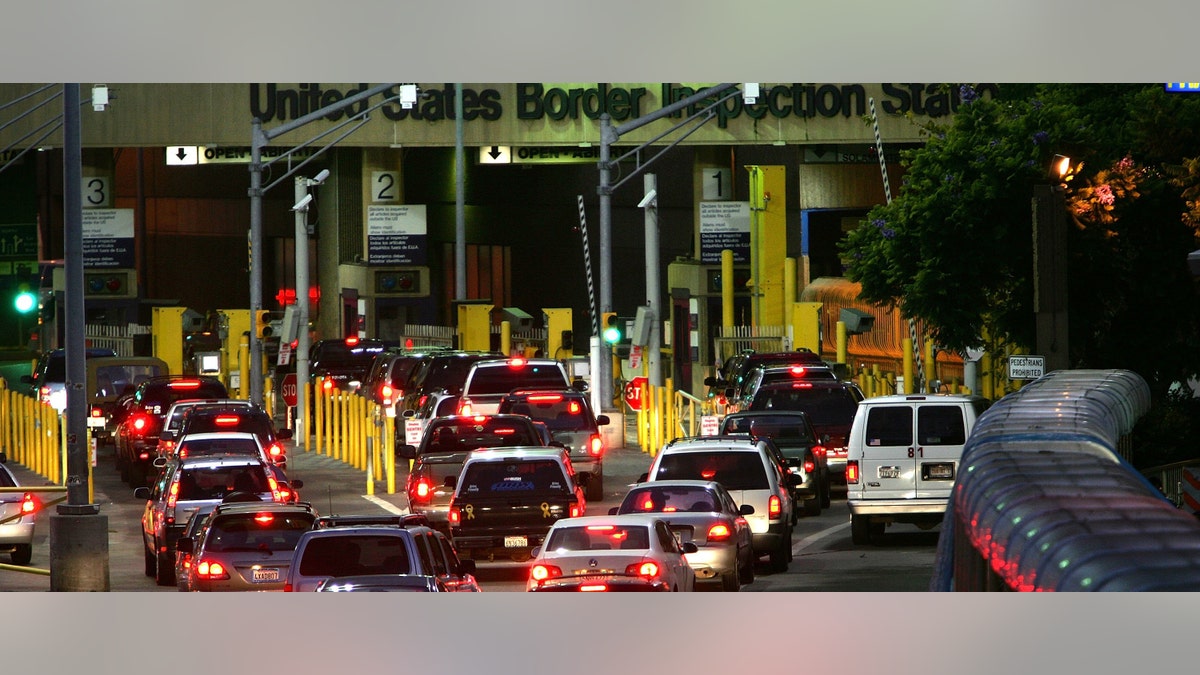
This border crossing from Tijuana to San Ysidro, California is the world's busiest border crossing. (2006 Getty Images)
Demands for tougher border security measures are causing a deep divide between Republicans and supporters of the immigration legislation that would give millions of people living without documentation in the U.S. the first steps toward citizenship.
On the first full day of debate on Wednesday, even modest changes were snared in the political crossfire as the two sides failed to agree on terms for voting on seemingly non-controversial proposals such as granting tribal officials a place on a Border Oversight Task Force.
Public polling shows general support both for tougher border security and for allowing those living in the United States to gain citizenship after meeting certain legal, financial and other conditions. On an issue as contentious as immigration, that made the intersection of the two a fertile ground for dispute.
As drafted, the legislation "authorizes a permanent legalization program for illegal immigrants regardless of whether the Mexican border is ever secured," said Sen. John Cornyn, R-Texas. The Senate's second-ranking leader also wants other measures implemented, including a biometric system to check everyone departing the country at a sea or airport, that Sen. Chuck Schumer, D-N.Y., said could take a quarter-century to take effect fully.
"We cannot, should not and will not tell those who have waited in the shadows for so long that they should wait for 25 years," said Schumer, who was part of a bipartisan "Gang of Eight" group of senators who negotiated the bill's basic provisions and then protected it from major changes in the Judiciary Committee last month.
In addition to taking steps to secure the border and begin a legalization process for millions, the White House-backed legislation would increase the number of visas for highly skilled workers, create a new program for the lesser-skilled to work in the United States and overturn a family-based system for legal immigration that has been in place for decades.
Senate Majority Leader Harry Reid, D-Nev., has said he wants a final vote on the measure before July 4.
Across the Capitol, House Speaker John Boehner, R-Ohio, says he hopes immigration legislation can move through committee by then, and be on the floor sometime in July.
While the obstacles to a final agreement are daunting, the Senate bill has support from both business and organized labor, two groups that are usually on opposite sides of most issues.
Additionally, senior Republicans have made it clear they envision the legislation as a way for the party to show a friendlier face to Hispanic voters, who overwhelmingly supported President Barack Obama last fall.
Even some GOP lawmakers who seem unlikely to vote for the Senate bill are recalibrating their rhetoric.
One, Sen. Rand Paul of Kentucky, told a Hispanic audience during the day that conservatives could accept a pathway to citizenship as long as the border security measures are tough enough.
"The first part of my plan — border security — must be certified by Border Patrol and an Investigator General and then voted on by Congress to ensure it has been accomplished," he said. "With this in place, I believe conservatives will accept what needs to come next, an issue that must be addressed: What becomes of the 12 million undocumented workers in the United States?"
While Paul spoke to an immigration forum held by the National Hispanic Christian Leadership Conference and Latino Partnership for Conservative Principles, Cornyn was making his case for changes to the bill from his desk on the Senate floor.
"My amendment has real border security triggers in place, while the Gang of Eight bill" lacks them, he said. He added that under the bill as drafted, there was no way to tell whether the goals for border security would ever be met.
A second amendment, offered by Sen. Charles Grassley, R-Iowa, would prohibit anyone from taking the first steps toward citizenship until the secretary of homeland security has certified to Congress that the U.S.-Mexico border has been under control for six months.
"Unfortunately, too many people have been led to believe that this bill will force the secretary of homeland security to secure the border. In fact, it does not guarantee that before legalization," said Grassley, the top Republican on the Judiciary Committee.
Grassley's proposal was among those caught up in the bickering.
When Reid sought agreement to vote on it and others, with 60 votes required for passage, the Iowan objected and called instead for majority rule. "Who's obstructing now?" he said to Reid, who frequently accuses GOP lawmakers of blocking action.
Based on reporting by The Associated Press.
Follow us on twitter.com/foxnewslatino
Like us at facebook.com/foxnewslatino




